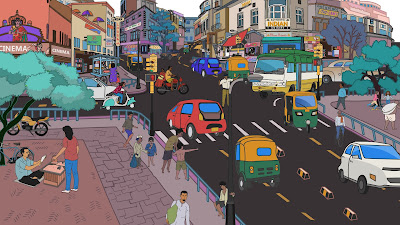Loved the short story. Intelligent and very compassionate – Ashok Row Kavi, journalist and one of the first out and proud Indians.
He'll get there eventually, I thought with a touch of regret as I stopped to buy peanuts from my favourite vendor. As the man skillfully and swiftly twisted a piece of paper into a puda , a cone, and filled it with hot, freshly roasted peanuts, I couldn’t help listening in to what those kids were saying.
“They’re hosting a free lunch at Seva Sadan,” said one in Hindi.
“Let’s go and eat till our stomachs are good and full,” the young one, about
six, said. “Who knows when our next meal will be?”
He eyed his companions, seeking approval for his cool cynicism. Indulgent smiles
on their faces they looked down at the youngest member of their motley pack.
The eldest, a scrawny teenager, slightly hunched and as emaciated as the rest,
gave him an affectionate swipe.
I couldn’t help an inward smile.
When the lights turned red, the boy, eager to prove his mettle, swiftly picked out a likely prospect and
dashed across to reach her before the others did.
“Twenty rupees, madam,” I heard him say.
She ignored him, staring straight ahead. Undeterred, he repeated his plea,
going as close as he dared, to try and catch her eye. She looked through him.
“Only twenty rupees.”
Again no response.
“Okay,” he said with an exaggerated sigh, pretending to give in to the hard bargain she drove. “Ten rupees. Only ten.”
The consummate little actor tilted his face in silent appeal, coaxing her to agree it was a reasonable compromise.
She continued to ignore him but her lips twitched.The tension went out of his little body. He turned to look triumphantly at the older boy who was standing watchful, at the traffic lights. The teenager gave him a half wave of approval.
The lights were still red when a hundred engines revved and began edging
forward. The boy started running ahead of the auto, knowing it would leap away
within seconds. If she did cough up, it would be at the last second. Any
earlier and she’d be swamped by other beggars. He raised his voice.
“Only ten, madam.”
As she sped away, she leaned right out. Hands outstretched they completed
the exchange. She was smiling broadly but he had already forgotten her. He
looked down at his booty and hastily zigzagged between vehicles that had picked
up speed. Reaching safety, he handed the note over to his scrawny companion at
the lights, who swiftly pocketed it.
Filled with resentment I watched, thinking typical uncharitable thoughts of
a typical, privileged Mumbaikar.
The man has perfectly good
limbs. Why doesn’t he get himself a job? Earn his own ten rupees?
Slightly ashamed, I grudgingly conceded that nobody would give such an
unkempt, unknown entity a job. I wouldn’t.
At least, he and his kind provided much needed protection to their tiny
wards in exchange for controlling the cash.
#
That evening, at dinner, I told the family about the boy and how the lady in
the auto had found him irresistible.
“The rascal could probably
teach psychologists a thing or two,” dad said, amid laughter.
“What’s a psychologist?” said our six-year-old.
“Well,” said dad, “just as a doctor knows everything about our bodies, a
psychologist knows about our minds.”
Our bright young daughter absorbed that with a serious face. She was our
adopted child and couldn’t have been more loved had she been our own flesh and
blood.
That's who the boy reminds me of, I thought.
He reminds me of Smita. She won our hearts from the moment she walked into the room on unsteady feet, clutching her warden's hand. That she felt vulnerable was obvious. What gave her away was the sudden flutter of long lashes, the dart of fear as she looked uncertainly from one face to the other. We sat there frozen, afraid to make any wrong moves. That is, all except mum. She squatted right down. The warden followed suit and between them they coaxed the first genuine smile out of her. Before long we were all on the floor, eating out of her tiny little hands. We wanted to take her home straight away – nurture her, get rid of that haunted look from her eyes, but adoption was a long process. We would have to be patient.
#
A few days later, on my way from Bandra station, I saw the boy again. His warden held him in a vice like grip. As the lights turned red, it was difficult to miss the anxious glance the others gave the boy before dispersing to beg. The teenager held on a moment longer before giving his young ward a little push. The boy, his eyes a horrible mix of fear and dull resignation, hobbled away, wincing and in obvious pain. His heart not in his begging he evoked neither pity nor a smile from the jaded Mumbaikar in the taxi. As the taxi drove off, the boy glanced fearfully at his scowling warden. What a change in that cheerful little face.
This time I kept mum at the table, hoping nobody would notice how disturbed
I felt. After dinner, we played with Smita for a while before putting her to
bed. We kissed her and bade our parents goodnight. Alone in our room at last, I
told Ashraf about the boy.
“To me he looked like he’d been abused,” I said, my voice low, even if
everyone had retired for the night.
When he did not respond, I said, “You know, sexually.”
“What?” Ashraf said in disbelief. “No. How could you tell?”
“He was walking awkwardly, for one.”
“Could be anything. A boil on his inner thigh.” Ashraf smiled in that
annoyingly superior way he had.
Why was he being so dismissive? Was it such a ridiculous assumption that the boy could have been sexually abused?
I felt aggrieved and my thoughts were less than charitable towards my partner. Maybe he doesn't want to get involved - disrupt his smooth life running on well oiled wheels! Doesn't he remember pictures of our new-born Smita at the orphanage? She looked like a large insect with thin, spindly limbs and a rib cage that looked like an exoskeleton. She had been left near a garbage dump. Had someone not gotten involved she wouldn't be with us today.
A shudder went through me. It was unthinkable.
They told us bluntly, had they been a few minutes late she would have been
eaten by rats. They'd rescued her and brought her to the orphanage. Nurturing
her back to health had been slow at first, but finally they had put her up for
adoption. Our darling daughter, our healthy, intelligent and smart Smita. It
still made me sick to think of those rats. How close we’d come to losing her
before we’d even found her!
Thankfully she didn't remember any of it but it had given her that haunted look that had cut us up the first time we'd met her. Couldn't Ashraf accept that people were cruel and selfish? That sometimes we did need to get involved, whatever the consequences to us?
“Yes. Could be,” I said to Ashraf, sounding testy even to myself, “except,
when he handed over the cash, he did not meet the older boy’s eyes. And when
that boy grabbed his hand along with the cash, and gave a mocking laugh, he
flinched and snatched his hand away.”
This time Ashraf was silent.
“We can’t interfere,” he said at last.
When he saw I was about to protest, he amended that quickly to, “Okay, why
don’t I come with you to Bandra tomorrow? See for myself?”
I nodded, not trusting myself to speak.
Doubt had already started creeping in. I couldn’t help wondering what difference it would make whether Ashraf saw the boy for himself or not. What could we do?
I slept fitfully that night.
Watching Ashraf’s tranquil features while he slept drove me insane. How could he? Every loud snore made me jump. Giving up on sleep, I got out of bed and went to our balcony to feel the gentle breeze and to try and empty my head of thoughts that were keeping me awake. They wouldn’t stop.
He’s right. There’s not much we can do.
He’s such a tiny creature. So helpless. Unable to fight back. Barely a week ago, I saw him cheeky and cheerful.
I finally got to bed, my last thought, we cannot not do anything.
#
.
.







